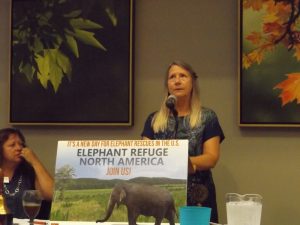Rotary learns about elephants in Attapulgus
Published 5:38 pm Tuesday, September 5, 2017
Rotarians were given an update Tuesday on the progress being made in the development of an Elephant sanctuary in near Attapulgus by Elephant Aid International. The speaker was Carol Buckley, CEO and founder of the organization.
First, a video was shown outlining the history of elephants and their mistreatment in their native lands, as well as those used for circus entertainment and zoos. It gave a vivid picture of elephant abuse, keeping them in shackles and beating them into submission.
Carol Buckley told how she came to found Elephant Aid International with the goal of improving the lives of elephants around the world. She spent 15 years in Tennessee working with retired elephants and learned about their personalities and natural tendencies.
She has traveled to Nepal in an effort to change the brutal culture that exists there with elephants, and to teach the caretakers and trainers better methods of training elephants. She pointed out that when elephants are free to roam, forage and socialize, they flourish. It changes their hearts and minds. She has found that their aggression is caused by fear in an unnatural situation, and that most of their problems are psychological.
She wanted to build a new rehabilitation home where retired elephants could roam freely in a space where they can live normally and be comfortable. After searching for two-and-a half years for just the right land, with just the right warm, humid warm climate and proper vegetation, she found 850 acres near Attapulgus that fulfilled her needs.
There are no elephants on the land yet, as they are still working on all the infrastructure, such as special fencing, a barn and clearing of old fences and rubbish.
However, she indicates the fencing is two-thirds installed and paid for.
Once all is ready, they will house only female elephants, with a limit of 10 to herd size. She estimates they will start to arrive in the late spring.
Ms. Buckley said they have learned that elephants live naturally in a matriarchal society, and they are not interested in breeding them for any additional problems.
Once the elephants arrive, they will be protected from the public, and the only way persons may view them is through cameras placed strategically around the reserve, with photos live-streamed on the website, www.ElephantAidInternational.org.
They will employ full-time maintenance and security personnel, as well as providing on-site veterinary care. Veterinarian Gigi Gaulin has recently moved from New Mexico to Attapulgus to assist with the project.
They are welcoming volunteers at this time to help clear old fencing and debris.
Ms. Buckley did address a question regarding changing attitudes of governments around the world regarding elephants. She indicated that they are a problem to the farmers who plant right up to the forest lines. In Nepal it is now illegal to kill an elephant, although they were recently given permission to kill a rogue elephant that has killed 17 people.
Again, she stressed that when elephants are in a comfortable place and able to roam freely, their behavior improves.
She is all about changing one world, one elephant at a time.






